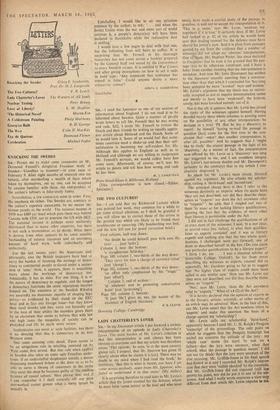Prof. Dr. M. J. Langeveld The Two Cultures? F. R.
Leavis Lady Chatterley's Lover The Warden of All Souls Nuclear Testing Peter Brown Love ol Liberty? L. M. Hopkins 'The Historical Novel' Martin Eve A Coldstream Painting Philip Matthews Georgian Bath R. D. George
The Si co Colin H. MacKay
Eva de Queiroz Desmond Flower Cerebration Michael Podro
I.
SIR,--Permit me to make Some comments on Mr. Desmond Fennell's delightlul Freudian study of Sweden—'Goodbye to Summer —in your issue ot February 9. After eight mouths of research into the subject, after marshalling d wealth of facts which taken by themselves, Jne oy one, can be accepted by anyone familiar with them, the end-product of the author's labours is hilariously tunny.
Nevertheless, a few commtnts seem in order. First. the emphasis on riches. The Swedes are, contrary co the author's repeated statements, by no means th: richest people in the world. The national income in 1959 was £489 pet head which puts them way behind Canada with £559. not to mention the US with £825. The national income is parhaps more uniformly distributed than in many other countries, but there is not such a tremendous so: to divide. What there is derives from what appears to be some sensible husbanding of natural resources and an enormous amount of hard work, both individually and collectively.
For the last twenty years the Americans and, previously, also the British taxpayers have had io carry the burden of beaming the message of demo- cracy to continental people erslaved under a succes- sion of 'isms.' Now, it appears, there is something nasty about the workings of democracy too. Admittedly, it has its sides. For one thing, it is in the nature of democracy to regulate. and the longer a democracy functions the snore regulations become heaped on. The members of the Swedish Riksdag are assuredly no statesmen capable of shaping higa policy—as evidenced by their stand on the EEC issue and in fact any foreign issue—but they know their local drunks and they carry out honestly and to the best of their ability the mandate given them by an electorate that seems to believe that with law and high taxes the inequities of society can be abolished and life he made more secure.
Sophisticates can sneer at such futilities, but there is no denying that this is democracy in its true Western sense.
One more amusing little detail. There seems ta he an ubiquitous rule in retailing summed up by 'First come, first served. But that rule when applied in Sweden also takes on some ugly Freudian under- tones. If an understaffed shopkeeper installs a device dispensing numbered tickets at the door so as to 1):: able to serve a throng of customers in the order they enter the shop he becomes guilty of 'the random tyranny of casual taboos.' Nice phrase that, and if I can remember it I shall certainly tell our poor overworked corner grocer what a nasty tyrant he actually is. Concluding, I would like to air one priceless sentence by the author, to wit: . . and when the Soviet Union wins the war and some sort of world survives it, a people's demccracy will have been declared in Stockholm while the radioactive dust is settling.'
I would love a few pages to deal with that one, but the following lines will have to suffice. It is surprising that Mr. Fennell in his thorough researches has not come across a booklet prepared by the General Staff and issued by the Governmeat to every Swedish citizen. It is entitled If War Conies and after giving instructions on how to act it ends in bold type: 'Any statement that resistance has ceased is false.' Could anyone desire a more exhaustive answer?
Stock holm
COSTA E SANDSTROM


































 Previous page
Previous page